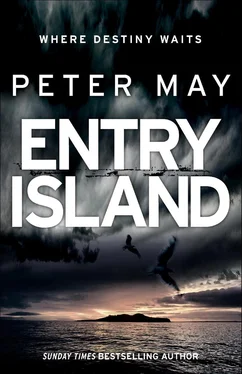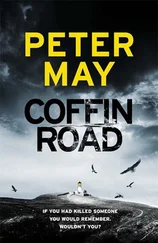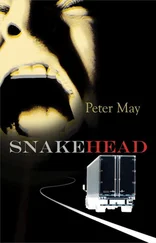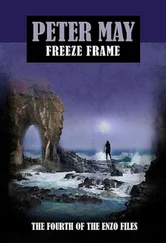Sime plunged the basement once more into darkness and climbed back up into daylight. Next along the corridor a door leading to a guest bedroom stood ajar. On the far side of it French windows opened into the conservatory. He wondered if any guests had ever slept here. It didn’t feel like it. There was a lack of warmth, of anything personal. It was furnished like a five-star hotel room.
Further along, another door led to the master bedroom, and Sime was surprised to find that it was just as impersonal as the guest room. There seemed to be nothing shared in here. No photographs, no mementos of happier times. No paintings on the walls. Not even clothes draped over chairs or lying on the bed, no slippers discarded at the bedside. There were no jars of face cream or make-up on the dresser, no combs or brushes with hair caught in the bristles. Just shiny, dust-free surfaces. The room was as sterile, it seemed, as the relationship it had played host to.
At the end of the hall, a door on the left led to her study, and crossing its threshold Sime at once felt a change in atmosphere. This was Kirsty Cowell’s private space and every cluttered surface and crowded bookshelf spoke of her. One entire wall was devoted to books. Everything from classical English literature to the ground-breaking American writers of the twentieth century — Hemingway, Steinbeck, Mailer, Updike; encyclopaedias, books on British and Canadian history, almost a full shelf on the history of Scotland.
There was a well-worn leather recliner with a shawl draped over it, and moccasin slippers beneath it. There were paintings on the walls, amateur efforts that made up for lack of technique in capturing the mood of the island. Crude sea views and clumsy landscapes. One was particularly striking. A line of black crows sitting along an electric cable strung between two telegraph posts, a typical island house behind them, painted a garish green and white, a sky of purple-edged clouds. And Sime realised that he hadn’t seen any seagulls on his two trips to the island. Only crows. He glanced from the window and saw them now in black huddled rows, sitting on rooftops and along fences and telephone lines, silent witnesses to an investigation of murder.
He turned back to the walls, and found his eye drawn by a framed black-and-white photograph of a middle-aged couple standing outside the summerhouse across the way. Kirsty’s parents, he assumed. Judging from their age, the picture had been taken only a dozen or so years before, yet it felt dated. Not only because it was in black and white, but the couple themselves seemed to belong to another era. The way they dressed and wore their hair. It was taken before the remodelling of the house, and the building looked older, old-fashioned, like the couple themselves.
He saw Kirsty in both of them. She was tall and willowy like her father. But she had her mother’s strong features, and her thick black hair, which here had already been invaded by a creeping grey.
He turned then to her desk. A surface cluttered with papers and bric-a-brac. A small wooden Buddha with a fat, laughing face, a mug that hadn’t been washed. Scissors, a letter-opener, innumerable pens and pencils in chipped ceramic cups, tissues, reading glasses, endless doodles on a large blotter. A reflection of idle moments of absent thinking. Whorls and stick figures, happy faces and sad. Some just lightly sketched, others worked over again and again until almost cutting through the paper. An indication, perhaps, of darker moods.
A pile of magazines testified to her interest in current affairs. Time Magazine, Newsweek, Maclean’s .
In a drawer he found an old family photo album bound in dark-green cracked leather, and sat in her captain’s chair to open it on the desk in front of him. Its pages were thick grey paper turned brittle with age. Discoloured black and white snapshots in the early pages were slipped into slits cut to hold them, captions written in faded ink beneath.
The very first photograph in the album was an overexposed sepia portrait of a very old woman, the glaze cracked and flaking in places. Underneath it, written in a copperplate hand, the legend Great-Great-Grandmother McKay, so discoloured that it was almost unreadable. It appeared to have been taken in the late nineteenth or early twentieth century, and Sime thought that perhaps this album had been started by Kirsty’s mother collating old family photos. He flipped forward through the pages, taking a journey through time that brought him to the arrival of baby Kirsty, a round quizzical face peering at the camera from the arms of her mother.
And then Kirsty as a little girl, aged seven or eight, staring solemnly into the lens. He flicked forward through the pages, and watched her grow up before his eyes. An awkward smile with two missing front teeth. Older now, with pigtails and braces. Then wearing glasses, hair cut short in a bob.
He stopped mid-turn, a tingling sensation all across his neck and shoulders, and let the page fall back. This was the little girl whose cut-out head he had found lying on the floor of Norman Morrison’s bedroom. And he understood now why it was that the child had looked so familiar. In spite of the hair and the glasses and the toothy smile. It was Kirsty.
He turned the next page and saw the dark square left by a missing photograph. The others around it were all of Kirsty at the same age, and he wondered if the absent snapshot was the very picture from which Morrison had cut her head. If it was, then either he had taken it without permission, or Kirsty had given it to him. Though he could not imagine why she would.
He sat staring at it for a long time, before turning the next page to continue his journey. Kirsty stretching through her teens, transformed in a few short years from a cute but gawky ugly duckling to a handsome young woman with knowing blue eyes that seemed to reach through the lens and across the years. And then suddenly the pictures stopped. As she had grown up, so her parents had grown older. And now, presumably, with the death of her mother, the photographic record of a happy family had come to an abrupt end.
He turned back again to the shadow of the missing picture and felt confusion as the sleeplessness of days and weeks washed over him in a wave of almost debilitating fatigue. He rubbed his eyes and glanced at the facing page. A thirteen- or fourteen-year-old Kirsty smiled back at him. Just the age that the Ciorstaidh in his ancestor’s journal would have been when next he saw her. And something drew his mind back to the diaries, to the stories his grandmother had read to them as children. And he could almost hear his ancestor’s voice.
I was, I think, about fifteen years of age when my father came back from the fishing that year.
In his absence I had been going daily to the moor to fetch the peats we cut in the spring and left drying in stacks called rùdhan mór . It was hard work loading the dried turves into wicker creels to carry the mile or so back to the village, but I had built a splendid stack behind our blackhouse. Peats laid one on the other in a herringbone pattern that allowed the rainwater to drain through. I had taken a great deal of care over it, because I knew my father would examine it critically on his return.
It had been a fine summer, but the first signs of autumn were in the air. And soon the sun would cross the equator, bringing the equinoctial gales that would herald the start of winter.
My father had been away for two months, as he was every summer for the herring fishing at Wick, and it always took him time to settle back into life on the croft. But he was in good spirits. It was the only season of the year when he had money in his pockets, and already it was burning a hole in them. Old blind Calum said to me that morning that it wouldn’t be long before my father would want to be off to Stornoway to spend it. And he was not wrong.
Читать дальше












